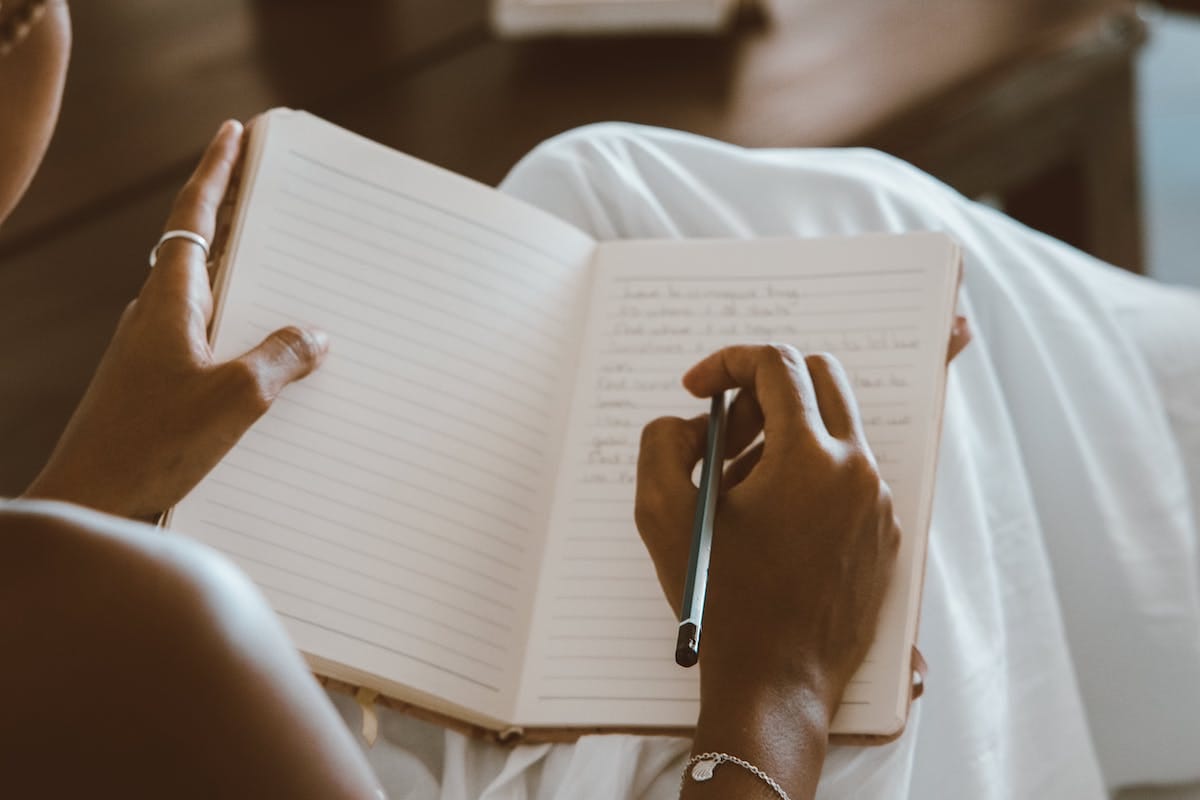The key to creating a clear head at night could be getting everything down on paper
Rolling around in bed, trying to get comfortable, my mind flitters with thoughts. I’m mulling over the day that’s just gone, replaying moments and fretting over whether I said the right things. This is interspersed with thinking about what I need to do tomorrow – those emails that need sending, that looming deadline.
Sound familiar? Sleep is something many of us struggle with. So, I was very interested when the writing-for-wellbeing expert, Kate McBarron, told me about the idea of using writing to help us sleep. Could putting pen to paper really help with getting some shut eye?
Writing for sleep
“There are two approaches I find helpful,” Kate says. “The first is about boosting that feel-good factor just before sleep. This might mean writing a gratitude list or a thank you note before you turn out the lights. The second is about reducing worry or feelings of stress. This can include jotting down a to-do list or spending some time writing down your thoughts and feelings from the day.
“Immersing ourselves in thoughts of gratitude just before sleep has been shown to improve sleep quality and duration,” Kate explains. “It’s been suggested that this is down to the role of ‘pre-sleep cognition’. Negative thoughts just before bed are likely to be overstimulating, whereas positive thoughts put us in a better state for sleep. When we write a gratitude list or thank you note, it encourages us to focus more deeply on the positives, particularly if we spend some time exploring the details.”
Writing around worries or emotions is important, too. “Getting things ‘down on paper’ and exploring them on the page can help relieve some of the processing burden from our mind,” says Kate. “The theory goes that when our brain is no longer so busy trying to make sense of an emotional event or worrying about an incomplete task, then it can enter a more relaxed state and we can fall asleep more easily.”

Gratitude lists
One of the techniques Kate suggests is writing a gratitude list before you go to bed, where you jot down things you are grateful for.
“The process will be more powerful if you allow yourself to focus on the details,” she explains. “So, for example, rather than saying ‘I’m grateful for a bed to sleep in’ and stopping there, spend some time thinking about the qualities you most appreciate. Is it comfortable? Are there things around you that spark happiness?
Occasionally, people will say to me that they can’t think of many things to add to their gratitude list. Sometimes it’s because the ‘big’ things – like being grateful for our home, or loved ones, or our life – are too big. Dive into the details and you might be surprised by how many smaller, but still meaningful, reasons for gratitude you’re able to find.”
Thank you note
A thank you note can be written to anyone in your life. “The idea isn’t to send the note, but to spend time focusing on something positive,” Kate says. “You can write to a person, an animal, or even an object or place. You might want to write to yourself – thanking your mind or body for helping you through the day.”
To-do list
Does your mind swirl with the things you need to get done tomorrow, making it harder to switch off and sleep? This is where a to-do list can come in.
“Writing to-do lists is something I find helpful when there’s a lot going on, and my brain won’t settle,” says Kate. “Before bed, I’ll write down as many things as I can think of that I need to get done over the next few days – things that are not part of my usual routine. Once the tasks are out of my head and safely stored on a piece of paper, or in the notes app on my phone, then my mind feels more at ease.”
Expressive writing
Many of us know the cathartic value of writing. “Getting thoughts and feelings on to the page can be helpful when you’re feeling stressed,” Kate tells me. This could be a one-off piece of expressive writing, or by keeping a journal.
“I’d suggest setting aside a time to write when you won’t be disturbed, and avoid doing it just before bed. Stirring up emotions before sleep can actually keep you awake, so make sure you write earlier in the evening. Only write about things that you feel are manageable. If you start to feel overwhelmed, then shift your focus to something positive.”

Giving it a go
The technique you choose will depend on what works for you, and what is affecting your sleep. I’ve found writing a to-do list particularly effective for getting thoughts out of my mind before bed.
“While a lot of people don’t see themselves as writers, many of us do write every day in some form or another,” reassures Kate. “We write messages to each other, shopping lists, social media posts, and emails. In these cases, writing is a means to an end. It might be helpful to think of the writing activities here in the same way – they are sleep aids. No previous experience is needed, and things like spelling, grammar, punctuation, and artistic ability aren’t important.”
It can take some time to try out different things, or see what suits your needs. So this evening, how about sitting with a notebook and having a go at one of the above?


Comments